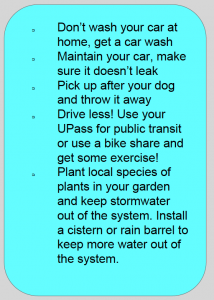For my action project, my group focused on the issue of stormwater. We held an educational outreach event on Red Square; two posters were prepared for our event, one detailing the issue of stormwater and the other detailing potential systemic and individual solutions. While our posters held some information relating stormwater to our class, much of that information was to be talked about by us.
All pollutants washed into storm drains when it rains constitute Stormwater: pollutants can include litter, oil, and brake particles from cars, basically any sort of particulates on land surfaces. With this definition in mind, it stands to reason that some of the drivers for increased stormwater output are global trade, globalization, development, and industrialization; as each of these plays a role in increasing urbanization, which is a catalyst for stormwater. This entails that the issues posed by stormwater are not just local issues, rather they are issues that will/are being faced by every urbanized area throughout the globe.
Once stormwater enters storm drains it generally ends up entering local waterways. According to the WA Dept. of Ecology, stormwater makes up at least 33% of all pollutants in WA waterways. This influx of pollutants has direct negative impacts on local salmon populations and marine aquaculture operations (e.g. shellfish farming, fisheries, etc.). Furthermore, if left unmitigated, the issue of stormwater has potential to decrease the amount of water available for irrigation purposes, thereby potentially lowering future food production/yield. This is less of a potential issue for most developed countries as they have infrastructure that deals with cleaning irrigation water in the first place. Those that would be most impacted by this would be developing/underdeveloped nations, many of which already face issues with food security/sovereignty.
While there are certainly things that individuals can do to decrease the amount of pollutants entering waterways, the most effective solutions will be systemic in nature. One would be an increased uptake in Low Impact Development (also known as green infrastructure e.g. rain gardens, pervious pavements, etc.), which serves to filter out pollutants in a natural way. Another would be increasing the amount of stormwater treatment facilities regionally (and globally). Lastly, I believe there is a need for a general paradigm shift in which we develop land with the goal of integrating ourselves into the already existing natural system, rather than repurposing the system to suit ourselves.

A short list of things you can do to mitigate contributing to stormwater, taken from one of our posters
